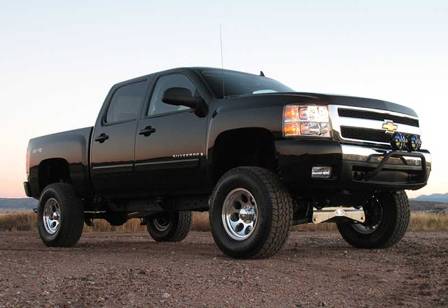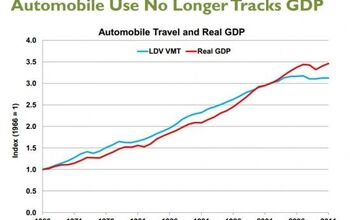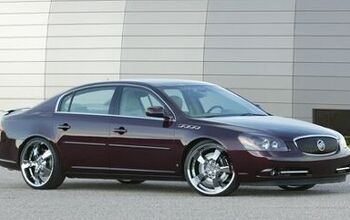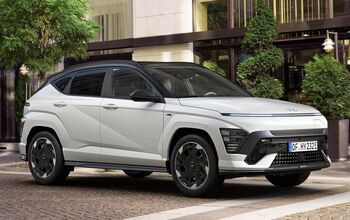America's Love Affair With Horsepower, RIP
I was walking the dog the other day when I heard a V8 bellow. I turned around to see a perfect example of a latter day muscle car: a Chevy Silverado pickup truck. I was surprised by my surprise. Although the Northeast represents Middle America’s automotive tastes about as well as Harvard professors reflect conservative political values, I wondered if society has reached the point where the sound of unabashed engine power has become, well, boorish. Has the average American automobile, once a symbol of status, virility and pride, been castrated? And is that a bad thing?
Focus on the word “average.” Yes, hundreds of thousands of enthusiasts continue to bask in the aesthetic, accelerative and aural afterglow of octo-cylindered SRT8, SS, GT, M and AMG-branded products. Widen the remit to include the tuned-four cylinder machines favored by the ricer set, and it’s clear that American car culture is alive and well and living in a comments section near you. But these vehicles cater to a relatively small subset of American consumers.
By the same token, you have to discount the eco-whips favored by equally passionate “green” car enthusiasts. In a recent study re: popular attitudes towards mass transit, four percent of respondents said they’d consider switching to mass transit on environmental grounds. While the survey methodology wasn’t entirely reliable, it supports a common sense conclusion: auto-oriented environmentalists proselytize from outside of the American mainstream. The media may swoon over hybrids, PHEVs, hydrogen fuel-cells and the like, but the average American aspires to a plain Jane Toyota Camry.
Or not. Post-September sales results, the general decline in vehicle sales (their lowest level in 15 years) and Detroit’s disastrous truck sales slump (down by 20-plus percent across the board) received the ink it deserved. Meanwhile, according to the American International Automobile Association, the Chevrolet Silverado and Ford F-Series scooped the top two sales slots.
Startling discounts may account for the fact that two American-made pickups edged-out the Toyota Camry in last month’s new car showroom hit parade. And there’s no question that the U.S. automobile market is undergoing an epic, convulsive shift, as hundreds of thousands of Americans abandon their SUVs (if and when they can) for more fuel efficient vehicles. But you have to wonder if falling gas prices and, more importantly, long-standing consumer tastes, mean that the death of the Great American Land Yacht has been greatly exaggerated.
Consider the much-lamented– if only by enthusiasts– “bloat” of the average American automobile. And by that I mean, of course, the Honda Accord and Toyota Camry.
In their early iterations, these Japanese cars were relatively diminutive compared to their American counterparts. Consumers chose the transplants for longevity and frugality and put-up with relatively tight packaging (especially when compared to their aging American counterparts and gas-guzzling SUVs). Today, numbers three and five on September’s sales chart are significantly larger than their predecessors. And they’re bisected by the Impala, an older Chevy that outsells its smaller and more modern “replacement.”
High gas prices or no, the automotive up-sizing trend continues. Even the new Mazda6 has traded zoom-zoom for elbow room. But something has been lost. (Don’t say handling, ‘cause that’s just you, a pistonhead, talking.) Thanks to mechanical and ergonomic improvements, the idea that a small-engined car is, ipso facto, a penalty box has left the building. While there’s some V6 up-selling down at the dealership, the vast majority of these popular cars are four-cylinder automobiles. More importantly, there’s no apology needed.
Mpg bragging rights have replaced engine envy. In a few short years, “That thing have a Hemi?” has gone from a come-on to a turn-off. At the risk of contradicting myself, the Toyota Prius has almost single-handedly made it “cool” to save gas. You can no more imagine the average American car buyer showing off his new car/truck by revving the engine than you can image a Dodge Challenger SRT8 driver whipping out his gas receipts.
This transition in the American automotive psyche– from a passionate lust for sheer horsepower to a profound admiration for fuel efficiency– is far from complete. But when a “car guy” like GM Car Czar Bob Lutz, the man who helped unleash the Dodge Viper and the Pontiac Solstice, spends his days touting the plug-in electric – gas hybrid Chevy Volt, you know which way the wind’s blowing.
In short, the bellowing, brash automobile, the car as a symbol of virility (a.k.a. penis substitute) is destined to become an increasingly obscure concept, even within the mucho macho pickup truck fraternity. BUT– automobiles are still, and will always be, a status symbol. And Americans will always love their faithful steeds, for one reason or another. Whether or not this petro-chemical reliant relationship (for now) is a good thing or not is irrelevant. It just is.
More by Robert Farago
Latest Car Reviews
Read moreLatest Product Reviews
Read moreRecent Comments
- Carson D I thought that this was going to be a comparison of BFGoodrich's different truck tires.
- Tassos Jong-iL North Korea is saving pokemon cards and amibos to buy GM in 10 years, we hope.
- Formula m Same as Ford, withholding billions in development because they want to rearrange the furniture.
- EV-Guy I would care more about the Detroit downtown core. Who else would possibly be able to occupy this space? GM bought this complex - correct? If they can't fill it, how do they find tenants that can? Is the plan to just tear it down and sell to developers?
- EBFlex Demand is so high for EVs they are having to lay people off. Layoffs are the ultimate sign of an rapidly expanding market.


































Comments
Join the conversation
Airhen- I think if someone bought a 1st gen Prius and stuck with it that would be cool. All people who buy cars every 1-3 years and then whine about resale value are uncool Any car with a manual transmission is cool
RF writes: BUT– automobiles are still, and will always be, a status symbol. And Americans will always love their faithful steeds, for one reason or another. Indeed! History, and archeology demonstrate that love of transportation object springs eternal. Thus, even 4,000-?,000 years ago, people were buried with their chariots.